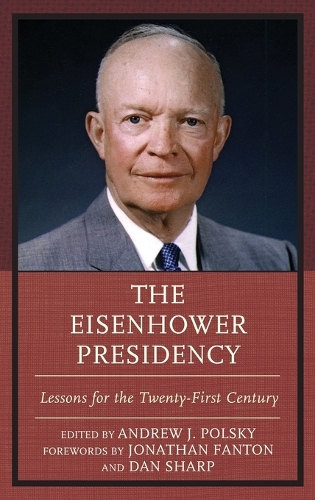
The Eisenhower Presidency: Lessons for the Twenty-First Century
(Hardback)
Available Formats
Publishing Details
The Eisenhower Presidency: Lessons for the Twenty-First Century
By (Author) Andrew J. Polsky
Foreword by Jonathan Fanton
Foreword by Dan Sharp
Contributions by Meena Bose
Contributions by Kenneth E. Collier
Contributions by Dale R. Herspring
Contributions by Geoffrey Kabaservice
Contributions by Douglas Little
Contributions by Adam McMahon
Contributions by David A. Nichols
Bloomsbury Publishing PLC
Lexington Books
7th December 2015
United States
Classifications
Professional and Scholarly
Non Fiction
Constitution: government and the state
Political leaders and leadership
973.921
Physical Properties
Hardback
296
Width 161mm, Height 237mm, Spine 27mm
621g
Description
We are in the midst of a Dwight Eisenhower revival. Today pundits often look to Eisenhower as a model of how a president can govern across party lines and protect American interests globally without resorting too quickly to the use of force. Yet this mix of nostalgia and frustration with the current polarized state of American politics may mislead us. Eisenhowers presidency has much to teach us today about how a president might avert crises and showdowns at home or abroad. But he governed under conditions so strikingly different from those a chief executive faces in the early 21st century that we need to question how much of his style could work in our own era. The chapters in this volume address the lessons we can draw from the Eisenhower experience for presidential leadership today. Although most of the authors find much to admire in the Eisenhower record, they express varying opinions on how applicable his approach would be for our own time. On one side, they appreciate his limited faith in the power of his words to move public opinion and his reluctance to turn to the use of force to solve international problems. On the other side, it was plain that Ikes exercise of hidden-hand leadership (in Fred Greensteins evocative term) would not be possible in the modern media environment that makes Washington a giant fishbowl and instant revelation an acceptable norm. Both Eisenhower admirers and skeptics (and many of the authors are both) will find much in these essays to reinforce their preconceptionsand much that is unsettling. Eisenhower emerges as an effective but flawed leader. He was in many ways the right man for his time, but limited because he was also a man of his time.
Reviews
On leaving office, Dwight Eisenhowers ranking as president was fairly low. Over time, his reputation has risen to the point that he is now regarded as one of the top ten presidents in US history. This collection of essays asks, 'What lessons can we learn from Ikes example as a leader' Editor Polsky's introduction acknowledges that 'to appropriate the past for use in the present is an inherently problematic enterprise,' yet the authors of these essays believe there is much to learn from Ikes example. Eisenhower viewed leadership as 'the ability to decide what is to be done, and then to get others to want to do it.' The essays cover a great deal of territory, including the nature of Ikes conservatism, dealings with Congress, party leadership, and civil rights (which David A. Nichols maintains is a stronger record than has been acknowledged). Perhaps the strongest essay is Polskys conclusion reexamining the importance of political opportunity to leadership. A valuable and useful addition to the literature on the Eisenhower presidency that challenges some of the accepted wisdom about Eisenhowers leadership. Summing Up: Highly recommended. Upper-division undergraduates and above. * CHOICE *
The Eisenhower Presidency is a valuable contribution to the literature on Eisenhower and on the presidency more generally. I recommend it wholeheartedly. -- Fred I. Greenstein, Princeton University
In my opinion, Dr. Andrew Polskys The Eisenhower Presidency: Lessons for the Twenty-First Century is the best and most important anthology of essays about the Eisenhower Presidency ever put together. The book consists of papers written by prominent presidential scholars and historians that were presented at a conference on the Eisenhower era at Hunter College in March, 2013. The book brightly illuminates major issues of Eisenhowers presidency that remain pertinent today. To name a few, it covers the problem of civil rights in the 1950s, space and technology questions that developed in the 1950s, questions about Eisenhowers innovative presidential style, the rise of conservatism as a political force in the late 50s, and a range of domestic and foreign policy topics including the Middle East. I have looked forward to a book like this on the Eisenhower presidency for a long time. I could not recommend The Eisenhower Presidency more highly. -- David Eisenhower, University of Pennsylvania
Author Bio
Andrew Polsky is Ruth and Harold Newman Dean of the School of Arts & Sciences at Hunter College of the City University of New York, and professor of political science at Hunter College and the Graduate Center, CUNY.
